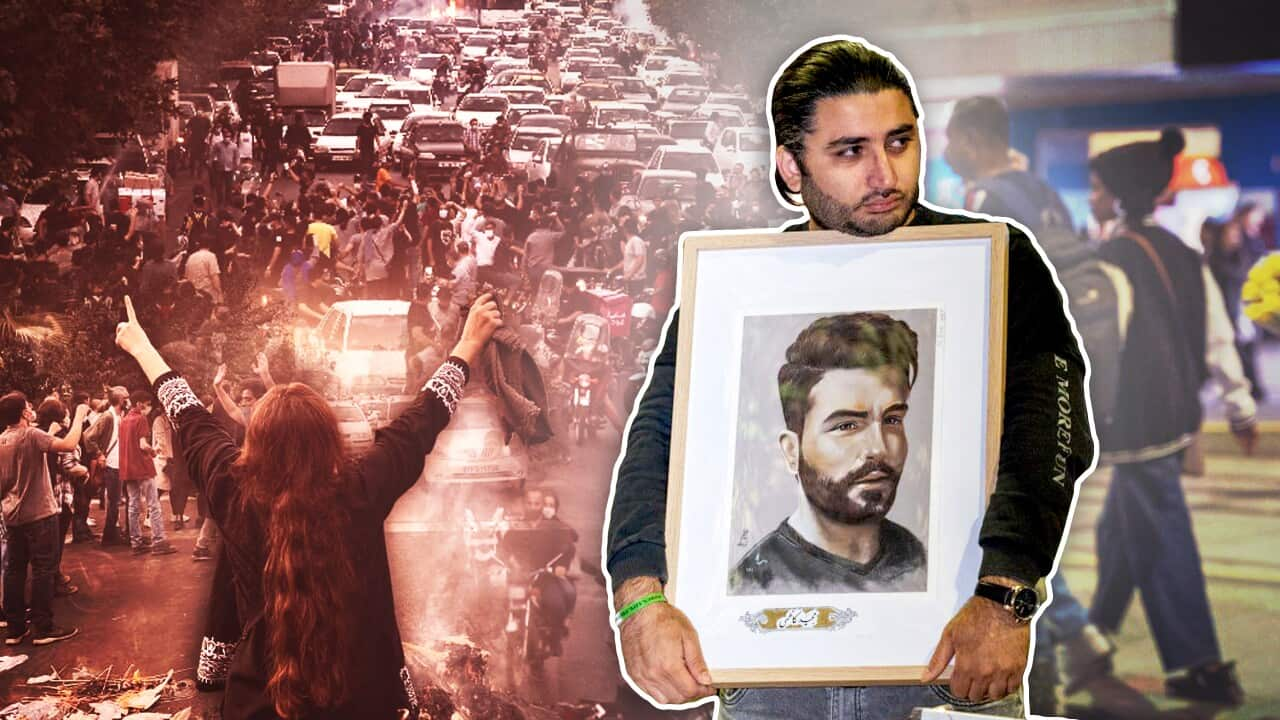Polling is underway in Iran’s presidential election with voters in Iran and abroad tasked with choosing a successor for former President Ebrahim Raisi, who was killed in a helicopter crash five weeks ago.
In Australia, members of the Iranian-Australian community are able to cast their ballot in Brisbane, Sydney, Canberra and Melbourne, but a group of protesters don’t plan to take the opportunity were outside the Iranian Embassy in Canberra.
Mohammad Hashemi is an Iranian-Australian activist, whose cousin Majid Kazemi was arrested and later executed after taking part in a Woman, Life, Freedom protest in Iran.

Protesters outside Iran's embassy in Canberra. Credit: SBS News.
"There is no democracy in Iran ... all we can see is a brutal regime and dictatorship.'
Another protester, Ali Elliin, echoed a similar sentiment.
"It’s just for show, it’s just for pretending it’s a democratic election and they choose who is going to be the President."

Ali Elliin protested outside the Iranian Embassy in Canberra. Credit: SBS News.
"When we realised that these elections are being held in Australia, it kind of shocked the community that some of these venues are Australian-owned businesses," AUSIRAN spokesperson Rana Dadpour told SBS News.
There is no such democracy in Iran, there's no fair or even unfair election in Iran.Rana Dadpour, AUSIRAN
"The community is really upset. Many of us moved to Australia to be safe and to feel that our voices are being heard.
"There is no such democracy in Iran, there's no fair or even unfair election in Iran, these are all fake propaganda rules that are being used in order to deceive the western community."
Elections as a pressure valve
There are four candidates vying for the role of President in Iran.
Two are considered hardliner candidates; former nuclear negotiator Saeed Jalili, and head of parliament and former commander of the Islamic Revolutionary Guard Corps (IRGC) Mohammad Bagher Qalibaf.
Mostafa Pourmohammadi is also in the running, known for his role in Iran’s 1988 massacre of political prisoners and Masoud Pezeshkian, who is known as a reformist figure.
The Embassy of the Islamic Republic insists Iran is a "dynamic democratic country", stating, "any well-known of (sic) professional Iranian with a common-sense definition of being eligible for running as head of the executive branch could register and get the chance to compete."
However, some experts don’t agree.
"I don’t think we can call this a democratic election because the process of becoming the candidate is really strict," Professor Dara Conduit, a Middle East specialist at the University of Melbourne, told SBS News.
"You can guarantee that this is not a free and fair election.
"Elections like this happen in most authoritarian regimes and are really important in terms of what’s called a pressure valve to release tension."
After casting his own ballot, Iran’s Supreme Leader, Ali Khamenei, urged maximum voter turn out, stating, "The durability of the Islamic Republic and its honour and reputation in the world depend on the presence of the people."
You can guarantee that this is not a free and fair election.Dara Conduit, University of Melbourne
Protests against Iran's presidential elections have been also held in several cities around the world, including London, Paris, Berlin and Milan.
"People who are campaigning against voting are well aware of the role elections play in authoritarian regimes in sort of legitimising and creating this veneer of popularity around a regime," Conduit said.
Polling locations cancel booking at the last minute
Some polling locations in Australia were changed at the last minute by the Iranian embassy amid community pressure, planned protest activity and cancellations.
NSW Scouts cance'led their booking yesterday, stating the "safety of our people, the facility and residents surrounding the facility is our top priority and we are aware of protest activity being planned."
This protest activity did not deter some of those who were willing to cast their vote in Australia.
"I’m just voting for our last chance of maybe democracy," one voter who did not wish to be identified told SBS News.
"Our leader is in the last few years of his life, and I think it is really important to use the chance to have a good president at this time."
Another voter said, "For the future of Iran, I have to vote."
Calls for IRGC to be listed on the terror list
Amid election tensions, some members of the Iranian-Australian community are also calling on the Australian to act.
"Our demands from the Australian government which we have repeatedly asked since the Woman, Life, Freedom movement was first of all to put the IRGC on the terror list," Dadpour said.
"The IRGC is the main source of power in Iran, they have control over all of our resources, they are responsible for repression of people, for killing of protesters in Iran."
A Department of Foreign Affairs and Trade spokesperson told SBS News, "The terrorist organisation framework within Australia’s Criminal Code does not allow for the listing of state entities.
"The Australian Government has used the tools available to it to take meaningful action against the IRGC, including through the imposition of targeted financial sanctions.”
Despite this, Independent MPs Allegra Spender and Zoe Daniels are the latest to join a growing list of politicians urging the government to list the IRGC as a terrorist organisation.
“Other like-minded countries like Canada have listed the IRGC as a terrorist organisation, and I think it is time for Australia to do that too," Daniels told SBS News.
"The situation in Iran, particularly for women, has been dire for some time."
In collaboration with SBS Persian.











